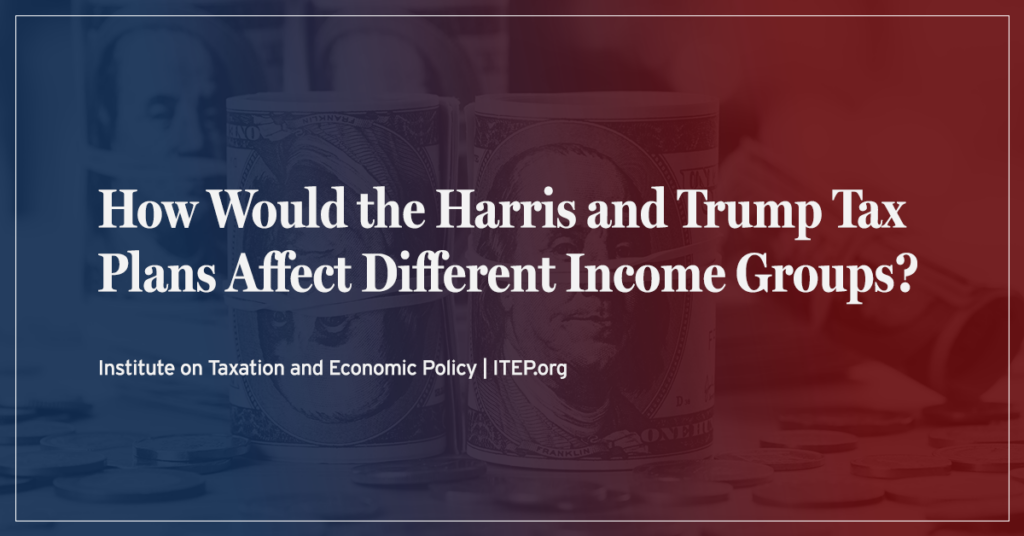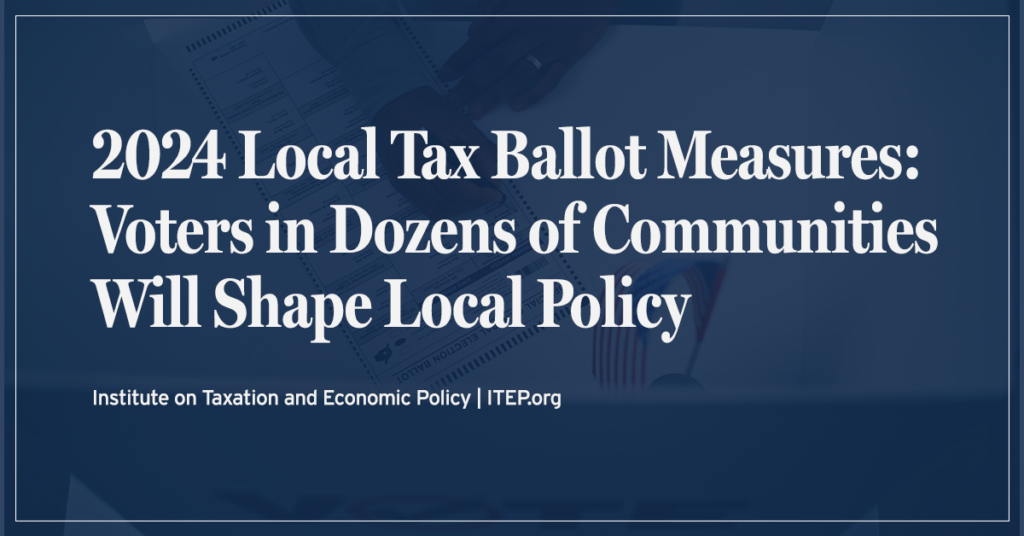
ITEP's Research Priorities
- 2025 tax debate
- Blog
- Cannabis Taxes
- Corporate Taxes
- Corporate Taxes
- Earned Income Tax Credit
- Education Tax Breaks
- Estate Tax
- Federal Policy
- Fines and Fees
- Georgia
- Immigration
- Income & Profits
- Income Taxes
- Inequality and the Economy
- ITEP Work in Action
- Local Income Taxes
- Local Policy
- Local Property Taxes
- Local Refundable Tax Credits
- Local Sales Taxes
- Maps
- Media Quotes
- News Releases
- OBBBA
- Other Revenues
- Personal Income Taxes
- Property & Wealth
- Property Taxes
- Property Taxes
- Publications
- Refundable Tax Credits
- Sales & Excise
- Sales, Gas and Excise Taxes
- Sales, Gas and Excise Taxes
- SALT Deduction
- Select Media Mentions
- Social Media
- Staff
- Staff Quotes
- State Corporate Taxes
- State Policy
- State Reports
- States
- Tax Analyses
- Tax Basics
- Tax Credits for Workers and Families
- Tax Credits for Workers and Families
- Tax Guide
- Tax Principles
- Tax Reform Options and Challenges
- Taxing Wealth and Income from Wealth
- Toolkits
- Trump Tax Policies
- Video
- Webinar
- Who Pays?
Rolling Stone: Team Trump Wants the Poor to Suffer to Fund His Tax Cuts for The Rich
November 20, 2024
The proposals under discussion would likely increase inequality and hardship in America at a time when nearly 4 in 10 households are struggling to pay their bills. In this case, the cuts to America’s meager safety net would be used to finance an unusually direct transfer of wealth upward. A review of Trump’s 2024 campaign tax promises by the Institute on Taxation and Economic Policy found his proposals, taken together, “would, on average, lead to a tax cut for the richest 5 percent of Americans and a tax increase for all other income groups.”
Salon: “No Mistake on Who They’re Serving”: Republicans Eye Medicaid, SNAP Cuts to Pay for Trump Tax Plan.
November 19, 2024
President-elect Donald Trump and his advisers are eyeing major cuts to federal safety net programs like Medicaid and food stamps to balance the cost of their massive tax agenda, The Washington Post reported Monday.
Associated Press: Sweeping Tax Overhaul in Louisiana Hits Snag in Sales Tax Expansion
November 15, 2024
Louisiana lawmakers on Thursday postponed a vote on a key bill in Gov. Jeff Landry’s sweeping and complex tax reform package.
Mansion Global: Trump Said He’s Bringing SALT Back. Tax Experts Say It’s Not so Easy.
November 14, 2024
“Most of the changes in the 2017 tax law were things that benefit the rich,” said Steve Wamhoff with the Institute on Tax and Economic Policy. “The cap on SALT deductions was one of the few things that limited tax breaks for the rich. That’s not to say that everyone affected by the SALT cap is rich, but the vast majority of impact is going to be with the richest 1%.”
New Yorker: Republican Victory and the Ambience of Information
November 14, 2024
Why didn’t the speeches register? Why did people persist in thinking that Harris was short on policy; that Trump’s programs would boost the American economy, despite a widely broadcast consensus from sixteen Nobel Prize-winning economists to the contrary; or that he would lower taxes for working people, though the Institute on Taxation and Economic Policy calculated that he would increase them? Even many of Trump’s critics think his first term marked a high point for border patrol, though more unauthorized migrants have been forced to leave under Biden. (Why was Biden’s Presidency widely dismissed as desultory, when, in fact, as my colleague Nicholas Lemann recently put it,…
New Jersey Policy Perspective: Fair and Square: Changing New Jersey’s Tax Code to Promote Equity and Fiscal Responsibility
November 14, 2024
Reforming New Jersey's tax system would reduce income inequality and provide revenues needed for public investments to make the state more affordable.
The Guardian: How a Republican Trifecta Makes Way for Trump’s Rightwing Agenda
November 14, 2024
With the confirmation that Republicans have won a majority in the House of Representatives, Donald Trump and his party will now have a governing trifecta in Washington come January, giving the new president a powerful perch to enact his rightwing agenda.
NerdWallet: What to Know About Harris and Trump’s Tariff Campaign Promises
November 5, 2024
It’s election week, and Vice President Kamala Harris and former President Donald Trump are making their last-ditch efforts to recruit voters. At the top of many Americans’ minds, of course, is the economy.
The Independent: Elon Musk Wants to Gut the Federal Government Under Trump. What Could That Look Like?
November 5, 2024
The wealthiest man on the planet is pumping tens of millions of dollars into Donald Trump’s campaign. He owns an influential social media company where he embraces right-wing influencers and conspiracy theories now dominating the platform. He has business interests with China and Russia’s Vladimir Putin’s regime while his companies receive billions of dollars in US government contracts.
New York Times: Trump’s Closing Argument: Lies, Distortions and Inaccuracies
November 4, 2024
Former President Donald J. Trump, in the closing days of the 2024 election, continues to be a font of exaggerations, misleading claims and outright lies.
Economic Security Project: The Equity & Prosperity Agenda: A Tax Plan to Promote a Fair, Inclusive, and Competitive Economy
October 31, 2024
The expiration of the Trump Tax Cuts and Jobs Act (TCJA) in 2025 is a critical opportunity to set economic policy for the next decade. The TCJA has been an abject failure for American families. Every year since it passed in 2017, it has diverted taxpayer money to exorbitant tax breaks for the ultrawealthy and powerful corporations while everyday Americans have struggled to make ends meet. The 2025 tax fight is our opportunity to promote competition and curb corporate concentration, lower costs for working families, raise the revenue we need to invest in core priorities and promote a democratized, multiracial economy.
Business Insider: What a Trump or Harris Presidency Would Mean for Your Tax Bill
October 31, 2024
In the fourth installment of BI's five-part series in the final stretch before the election, Business Insider is looking at the ways each candidate's policies could affect how much you pay in taxes. (Read part one about investments, part two about costs, and part three about housing.)
New York Times: Trump Flirts With the Ultimate Tax Cut: No Income Taxes at All
October 24, 2024
Former President Donald J. Trump has spent much of the presidential campaign brainstorming new, and sometimes untested, ways to cut taxes. In the election’s final stretch, he raised the possibility of going even further: eliminating income taxes entirely.
How Would the Harris and Trump Tax Plans Affect Different Income Groups?
October 23, 2024 • By Jon Whiten

Presidential candidates Kamala Harris and Donald Trump have put forward a wide range of different tax proposals during this year’s campaign. We have now fully analyzed the distributional impacts of the major proposals of both Vice President Harris and former President Trump in separate analyses. In all, the tax proposals announced by Harris would, on average, lead to a tax cut for all income groups except the richest 1 percent of Americans, while the proposals announced by Trump would, on average, lead to a tax increase for all income groups except the richest 5 percent of Americans.
American Immigration Council: Mass Deportation: Devastating Costs to America, Its Budget and Economy
October 18, 2024
In recent months, leading politicians and policymakers have renewed calls for mass deportations of immigrants from the United States. While similar promises have been made in the past without coming to fruition—during the 2016 presidential campaign, for example, Donald Trump pledged to create a “deportation force” to round up undocumented immigrants —mass deportation now occupies a standing role in the rhetoric of leading immigration hawks. To cite just one example, former U.S. Immigration and Customs Enforcement (ICE) director Tom Homan has promised “a historic deportation operation” should a hawkish administration return to power. While some plans have envisioned a one-time,…
New York Times: How Trump’s Radical Tariff Plan Could Wreck Our Economy
October 18, 2024
As a result, tariffs would raise the cost of living more for middle- and lower-income families than the average. An estimate by the Institute on Taxation and Economic Policy, which assumes a 20 percent tariff, finds that it would reduce the real income of families in the bottom fifth of earners by 5.7 percent, of middle-income families by 4.6 percent, but of the top 1 percent by only 1.4 percent. An analysis by the Peterson Institute for International Economics arrives at similar numbers. In other words, Trump’s 2.0 tariffs would in effect be a strongly regressive tax increase, imposing a…
CBS News: Trump’s Plan to Deport Millions of Immigrants Would Cost Hundreds of Billions, CBS News Analysis Shows
October 18, 2024
Immigration researchers, lawyers, and economists have pointed to immense constitutional, humanitarian and economic problems posed by Trump's oft-repeated pledge. But beyond the anticipated damage to immigrant families, communities and local economies, the roundup and deportation of some 11 million people is near impossible to bankroll, according to an analysis of U.S. budget and immigration court data by CBS News.
Variety: From Tariffs to Taxes to Tyranny, Hollywood Braces for the Possibility of a Donald Trump Victory
October 18, 2024
Abbasi’s experience says a lot about the anxiety gripping the entertainment world as it watches a tumultuous, enormously consequential election unfold. From corporate suites to studio lots, Hollywood is bracing for a possible Trump return, one that could bring chaos and deepen political divisions in a polarized country.
2024 Local Tax Ballot Measures: Voters in Dozens of Communities Will Shape Local Policy
October 17, 2024 • By Rita Jefferson

Next month, voters across the country will weigh in on many local ballot measures that will have a profound effect on the adequacy of our local tax systems and whether cities and communities can fund public needs. These are in addition to statewide ballot questions, many of which have local implications this year.
2024 State Tax Ballot Questions: Voters to Weigh in on Tax Changes Big and Small
October 17, 2024 • By Jon Whiten

As we approach November’s election, voters in several states will be weighing in on tax policy changes. The outcomes will impact the equity of state and local tax systems and the adequacy of the revenue those systems are able to raise to fund public services.
Audio: ITEP’s Amy Hanauer Talks Presidential Tax Plans on NerdWallet Podcast
October 17, 2024
Paycheck Politics: What Presidential Tax Plans May Mean for Your Wallet. Listen here.
Washington Center for Equitable Growth: The Promise of Equitable and Pro-Growth Tax Reform
October 16, 2024
The impending expiration of large portions of the 2017 Tax Cuts and Jobs Act at the end of 2025 presents federal policymakers with a significant opportunity to reform the federal tax code in the United States. Too often, political openings for pro-growth tax reform have instead been transformed into opportunities to introduce new tax cuts for those at the top of the income and wealth distribution. Proponents of these tax cuts usually defend their actions by invoking a now-widely discredited “trickle-down” theory of economic growth.
Washington Post: “Off the Charts”: How Trump Tariffs Would Shock U.S., World Economies
October 16, 2024
Former president Donald Trump is campaigning on the most significant increase in tariffs in close to a century, preparing an attack on the international trade order that would likely raise prices, hurt the stock market and spark economic feuds with much of the world.
New York Times: Trump and Harris Both Like a Child Tax Credit, but With Different Aims
October 16, 2024
Vice President Kamala Harris has made an expanded child tax credit central to her campaign, and former President Donald J. Trump boasts, “I doubled the child tax credit.” With a quick look, voters might think the child-rearing subsidy the rare matter on which the rival candidates agree.
Los Angeles Times: Here Are 4 Campaign Promises from Trump. What Are Their Chances if He Wins?
October 16, 2024
The economic impacts would be huge. In California, an estimated 1.5 million workers — 7% of the state’s labor force — are undocumented, according to the Pew Research Center. The Institute on Taxation and Economic Policy, a left-leaning think tank, found that undocumented workers paid $96.7 billion in taxes in 2022, including $8.5 billion in California.
